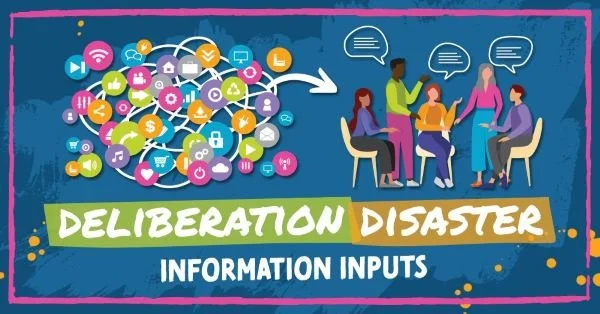A deliberating group is made up of randomly selected citizens from all walks of life. Just as we would see in any community group, these ‘mini-publics’ are made up of people with diverse backgrounds, perspectives, communication styles and behaviours. We're exploring some of the most common types of behaviours we might see in a deliberative process, their impacts, and some guidelines for working with them effectively.
WHEN DELIBERATION GOES WRONG: POWER
Power is always at play and often in surprising and unexpected ways. It’s your job as a project manager, leader, facilitator or engagement professional to notice and foresee power problems, address and prevent power imbalance and protect the integrity of your engagement process. In this deliberation disaster we let you know where power issues tend to lie, what you can do about them, and what your role is in tackling them.
WHEN DELIBERATION GOES WRONG: COMMUNICATION
Deliberative engagement aims to build trusted decisions. That’s only achievable if the people impacted by the outcome have access to information about the process. This isn’t as easy as telling your communication team to send out a media release or publishing a few social posts telling your community the panel or jury is happening. Your communication approach needs to be thoughtfully planned, aligning communication and engagement efforts and ensuring deliberative principles aren’t compromised.
WHEN DELIBERATION GOES WRONG: POOR TOPIC CHOICE
What are you asking your participants to help you with? Topic choice and how you craft the question, challenge or remit you put to your community is critical to a successful process. In this deliberation disaster, we explore the most common mistake we see made. Plus, there are free tips for selecting and communicating a topic that will result in better response rates, a more meaningful experience for participants and more useful outputs for decision makers.
WHAT IF WE COULD ANSWER THESE TOUGH QUESTIONS?
We need to find a way forward. We’re seeing increasing trust divides between government and their citizens. You only have to see or hear a few news headlines to know that humans are facing really big problems that decision-makers are getting stuck on. From housing affordability and gender equality through to water security, climate change and the energy transition, there are tough issues before us that we simply have to solve. What if there was a way to tackle these ‘wicked problems’, answer the big questions and collectively agree on a way forward that was in the best interest of the many not the few? Here’s an insight into what that might look like - some inspiration, possibility and hope amongst the despair.
WHEN DELIBERATION GOES WRONG: INFORMATION INPUTS
Deliberation – what can go wrong? The short answer is lots! In our second article in this new series, we tackle ‘information inputs’. We’re talking about information you feed into a deliberative process to support the deliberating group’s discussion. It’s super important to get this right and the quality of what you put in will affect the quality of what you get out. So, we’re helping you avoid potential pitfalls and learn from the mistakes of those who have gone before you. Learn what to do (and what not to) inside …
WHEN DELIBERATION GOES WRONG: RECRUITMENT
Deliberation – what can go wrong? The short answer is lots! A new series to help your organisation avoid possible future pain and learn from the mistakes of those who have deliberated before you. In our first article, we’re exploring the complex, specialised world of recruitment. It’s a critical part of the deliberation puzzle and one of the biggest tripping hazards organisations face. Get it wrong, and it can undo everything you’re trying to achieve. Discover how to avoid disaster inside …
#MONTHLYMYTH: ACCESSIBILITY IS EASIER IN-PERSON THAN ONLINE
Making processes accessible for everyone is something we all strive for in the engagement sector. Most people naturally think that this accessibility is most easily achieved in face-to-face sessions where you can see or hear the interpreters. However, in this blog Q&A, we hear directly from two interpreters and two participants about the many accessibility advantages (and some disadvantages) to online workshops that are worth considering.
HOW TO HAVE HARD CONVERSATIONS WITH ANGRY COMMUNITIES
Are you trying to engage with people that are highly emotional or resistant to participating and collaborating? Many of us are experiencing fear and anxiety. We’re living in a world where communities are facing change, uncertainty, natural disasters and more. Engaging around any issue can be challenging. This post prepares you for hard conversations, giving you tips that will help you work with outrage, prepare communities for big events and help them to process and recover from previous trauma.
DILEMMA DISCUSSED: GETTING INTERNAL BUY-IN FOR ENGAGEMENT
Today we’re responding to one of the most common engagement challenges nominated by the subscribers to our newsletter The Discussion. How to get internal buy-in and embed quality engagement across an organisation? We’ve got free resources, learnings-based tips and training courses to help you dial down this dilemma.














